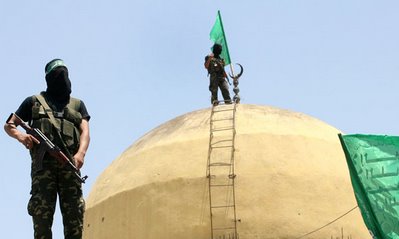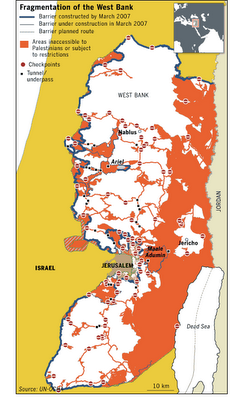Losing even while they're winning.
 There are shocking acts of cynicism, and then there's the United States, delighting in the slaughter that's taken place this week in the Gaza Strip, brazenly announcing that since Fatah has now been wiped out despite the US's efforts in arming them, that they'll lift the boycott imposed since Hamas was elected last year, as Mahmoud Abbas has kicked them out of government. When Hamas won what were the most free and fair elections in the Middle East outside of Israel itself, the Palestinian people suffered for their impertinence in voting for terrorists. When Hamas wins through armed struggle, the Palestinian people are rewarded for dying and the civil war which might be yet to come.
There are shocking acts of cynicism, and then there's the United States, delighting in the slaughter that's taken place this week in the Gaza Strip, brazenly announcing that since Fatah has now been wiped out despite the US's efforts in arming them, that they'll lift the boycott imposed since Hamas was elected last year, as Mahmoud Abbas has kicked them out of government. When Hamas won what were the most free and fair elections in the Middle East outside of Israel itself, the Palestinian people suffered for their impertinence in voting for terrorists. When Hamas wins through armed struggle, the Palestinian people are rewarded for dying and the civil war which might be yet to come.Another week of violence, summary executions and inhumane brutality has in reality changed very little. Despite the Guardian claiming in its leader today how very unexpected this was, like Hamas's overwhelming electoral victory last year, neither was that much of a surprise. After years of corruption under Fatah, helmed by Yasser Arafat whom Israel refused to negotiate with, imprisoned all the while in his compound up until he left to die in Paris, the Palestinians voted for change. Rather than recognising that the very tactics of non-negotiation, the gradual colonisation of the West Bank by settlements and checkpoints and the open-air imprisonment imposed on Gaza were fueling radicalism, the status quo continued, and Hamas were duly elected. Instead of realising that the people had voted for an end to corruption and for peace rather than Hamas and its rejectionism, the international community went along with Israel and imposed the boycott. Everything that has happened since then can be directly linked back to that decision.
This isn't without Hamas and Fatah trying to build bridges between each other, and with Israel. The agreement which led to the coalition between the two in February was meant to break the boycott, while acknowledging that Hamas had the right to continue to refuse to recognise Israel. This however wasn't good enough for Israel and the US, who continued to enforce it. There was never going to be a better settlement reached between Hamas and Fatah without new elections being called which would have only likely resulted in Hamas winning again, yet this least worst option was boycotted just the same.
As Alvaro de Soto, the outgoing UN envoy wrote in his leaked valedictory report, this refusal to countenance Hamas in any way is "systematically pushing along the violence/repression cycle to the point where it is self-propelling." With no sign of any change, Hamas saw the opportunity to take full control in Gaza where it has long been in the ascendant. Why not, when whatever they do won't make any difference to their overall situation? The fighting has mercifully appeared to end; yesterday calm seemed to return to Gaza, and while the warring factions both carried out what can easily be described as atrocities against one another, Hamas has now released those that were briefly held, and is making overtures towards talks and reconciliation. Whether this will last or not is the key question: as was reported this week, this was no longer about which faction ruled Gaza, this was about taking revenge for brothers and family members killed in the ructions. The simmering anger may not be boiling over yet, but it could easily erupt again, especially if Fatah, now ever more likely to be getting open US backing, carries out more revenge attacks in the West Bank.
 The indifference to Palestinian suffering, especially considering how attacks on Israel apart from the rockets fired at Sderot have collapsed, is just as influential in this latest catastrophe as Hamas and Fatah are. We've just commemorated 40 years since the six-day-war, and bit by bit the West Bank is broken up, settled in by extreme right-wing religious Jews and those who enjoy the subsidies, vast areas of it occupied only by the IDF, checkpoints making traveling around the territories next to impossible for ordinary civilians, all while the security wall swallows up yet more land, not to mention how all these factors make it next to impossible for those unlucky enough to live there to actually work in any meaningful sense. This isn't about protecting Israel any longer, it's about making life as uncomfortable as possible, about systematically destroying any hope that there will be any kind of viable Palestinian state left once Israel's decided which parts it wants to keep and inflicting collective punishment on a people who have been waiting for over half a century for justice for having the cheek to continue resisting. The world it seems is more than prepared to let this happen, more concerned with boycotts other than the only one which matters(ed) and with stopping one of the few critical academics from continuing in his job. Israel has already triumphed.
The indifference to Palestinian suffering, especially considering how attacks on Israel apart from the rockets fired at Sderot have collapsed, is just as influential in this latest catastrophe as Hamas and Fatah are. We've just commemorated 40 years since the six-day-war, and bit by bit the West Bank is broken up, settled in by extreme right-wing religious Jews and those who enjoy the subsidies, vast areas of it occupied only by the IDF, checkpoints making traveling around the territories next to impossible for ordinary civilians, all while the security wall swallows up yet more land, not to mention how all these factors make it next to impossible for those unlucky enough to live there to actually work in any meaningful sense. This isn't about protecting Israel any longer, it's about making life as uncomfortable as possible, about systematically destroying any hope that there will be any kind of viable Palestinian state left once Israel's decided which parts it wants to keep and inflicting collective punishment on a people who have been waiting for over half a century for justice for having the cheek to continue resisting. The world it seems is more than prepared to let this happen, more concerned with boycotts other than the only one which matters(ed) and with stopping one of the few critical academics from continuing in his job. Israel has already triumphed.Labels: Fatah, Gaza, Hamas, Israel-Palestine, Palestinian "civil war"


